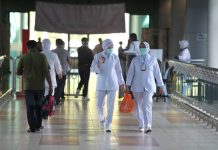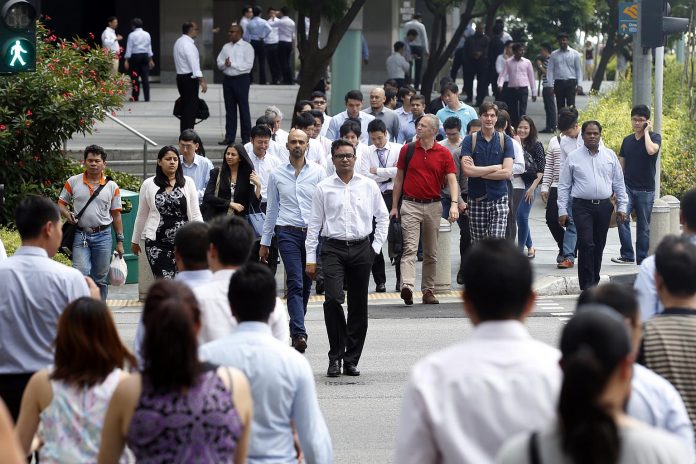Business confidence in Singapore is growing with 68 per cent of organisations expecting business activity to increase in 2018. This is a key finding from the 2018 Hays Asia Salary Guide which highlights salary and recruiting trends based on responses from more than 3,000 employers across Mainland China, Hong Kong, Japan, Malaysia and Singapore.
57 per cent of those surveyed also saw an increase in business activity in the last 12 months. Optimism is also growing about the expected performance of Singapore’s economy in 2018 with 28 per cent of employers expecting the economy to strengthen further in 2018. This is an increase of 17 per cent from what was previously reported and highlights a growing optimism that all major engines of growth in Singapore’s business and economic landscapes are synchronized in an upward trajectory.
However, despite the positive feel good factor in the country, employers will remain cautious when it comes to increasing headcount with only 14 per cent intending to do so in 2018 vs the 41 per cent who did in 2017. Salary increases will also be moderate in 2018 with 49 per cent planning to offer salary increases from between 3-6 per cent, three per cent up from the actual reported in 2017. 14 per cent of employers in 2018 plan to offer salary increases of more than 6 per cent in the year ahead.
“The economic outlook for Singapore is very positive, but our research shows employers will take a conservative approach to both permanent hiring and salaries in 2018 to make the most of these conditions,” said Lynne Roeder, Managing Director of Hays Singapore. “Although most companies in Singapore plan to award only modest salary increases during their next review period, we do expect to see significant increases for candidates with niche skills moving jobs as well as those with skills in short supply in 2018,” said Lynne. “For candidates, these conditions represent something of a challenge. Those staying in a job are likely to see only modest salary increases while those changing employers have a better chance of securing a higher salary, but there are likely to be fewer new jobs coming to market.” “Candidates must do their research on what is happening in their sector to assess how much power they have in the market in 2018 and whether they need to do more to develop the skills in greatest demand,” said Lynne.
A preoccupying worry for many employers in Singapore is the continuing skills shortages issue in the country that is also a prevailing theme across the Asia region. Down two per cent from last year, 94 per cent of employers believe that skills shortages (without doubt or will be some impact) will hamper the effective operations of their businesses.
Areas of greatest skill shortages:
In Singapore, employers reported that the top five hardest roles to recruit for are:
¥ Middle management Sales roles (nominated by 22 per cent of employers)
¥ Middle management Accountancy & Finance roles (nominated by 19 per cent)
¥ Middle management IT roles (nominated by 18 per cent)
¥ Entry up to middle management Sales roles (nominated by 18 per cent)
¥ Entry up to middle management Accountancy & Finance roles (nominated by 16 per cent)
Benefits
The majority of employers in Singapore (89 per cent) offer staff benefits with 93 per cent providing ‘health/medical benefits’, 43 per cent ‘car/car allowance’, 36 per cent ‘life assurance’ and 16 per cent a ‘housing allowance’.
Bonuses
53 per cent of employers told us they plan to award bonuses to more than 50 per cent of staff, down five per cent from last year. Most of our Singapore respondents (89 per cent) said bonuses would be based on individual performance with a further 87 per cent indicating company performance as the reason why bonuses would be paid in their organisation.
Main candidate findings for Japan
Candidate trends revealed in the 2018 Hays Asia Salary Guide include:
¥ 64 per cent of candidates are willing to relocate for a job (up one per cent from last year).
¥ 66 per cent of candidates believe their skills will be relevant in five years time; eight per cent do not expect their skills to be relevant and 26 per cent were unsure.
¥ 35 per cent of candidates spend little to no personal time on professional development, 32 per cent spend 1-2 hours weekly, 22 per cent spend 3-5 hours weekly, eight per cent spend 6-10 hours weekly, two per cent 10-24 hours weekly and one per cent more than 24 hours weekly.
¥ 42 per cent regard their current work-life balance as “good” and a further 18 per cent as “very good”. 25 per cent rate their work-life balance as “average”, ten per cent as “poor” and five per cent as “very poor”.
¥ Women held 30 per cent of management roles at the time of our survey – down one per cent as reported in our previous survey.
¥ 19 per cent of roles in Singapore are held by foreigners, down two per cent from our previous survey.
¥ 42 per cent see career progression opportunities where they work currently while 24 per cent see none. 34 per cent are unsure.
¥ 61 per cent believe their performance is fairly evaluated by their employer while 39 per cent do not.
Source: Hays




















